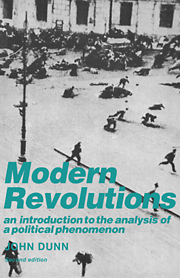Book contents
- Frontmatter
- Contents
- Preface to the first edition
- Introduction to the second edition
- Introduction: the ideological dilemmas of moden revolution and its analysts
- 1 Russia
- 2 Mexico
- 3 China
- 4 Yugoslavia
- 5 Vietnam
- 6 Algeria
- 7 Turkey
- 8 Cuba
- Conclusion: approaches to the ideological assessment and causal explanation of modern revolutions
- Notes
- Bibliography: guide to further reading
- Supplementary reading, 1971–88
- Index
- Frontmatter
- Contents
- Preface to the first edition
- Introduction to the second edition
- Introduction: the ideological dilemmas of moden revolution and its analysts
- 1 Russia
- 2 Mexico
- 3 China
- 4 Yugoslavia
- 5 Vietnam
- 6 Algeria
- 7 Turkey
- 8 Cuba
- Conclusion: approaches to the ideological assessment and causal explanation of modern revolutions
- Notes
- Bibliography: guide to further reading
- Supplementary reading, 1971–88
- Index
Summary
The title of this study is intended seriously. It is introductory in the limiting sense that reading it is not a proper basis for arriving at a firm opinion about the meaning of any modern revolution, let alone modern revolution as a whole. The enterprise to which it is offered as an introduction is the study of modern revolutions, the understanding of their character and of the causes of their occurrence. Insofar as any politically concerned person chooses to have reasons for their opinions, such study is plainly a necessary preliminary to any form of ideological assessment of revolutionary or other political phenomena. Revolution is a fiercely and an inevitably contentious topic. Indeed there are necessarily ascriptive as well as descriptive components even in the very identification of a set of events as constituting – or failing to constitute – a revolution. Hence it would be absurdly disingenuous and – in the light of the discussions which follow – implausible to the point of fatuity to pretend that this study does not embody the attitudes of the author. But it is not written in order to foist these off on the unsuspecting or indeed on the suspicious reader and the last response which it is intended to elicit is passive assent. Ideally what it hopes to provide is a sense of the necessary complexity of modern revolution and an understanding of why the bland professional claim of political scientists or political sociologists to aloof detachment in the face of these phenomena must be in such bad faith.
- Type
- Chapter
- Information
- Modern RevolutionsAn Introduction to the Analysis of a Political Phenomenon, pp. ix - xivPublisher: Cambridge University PressPrint publication year: 1989



